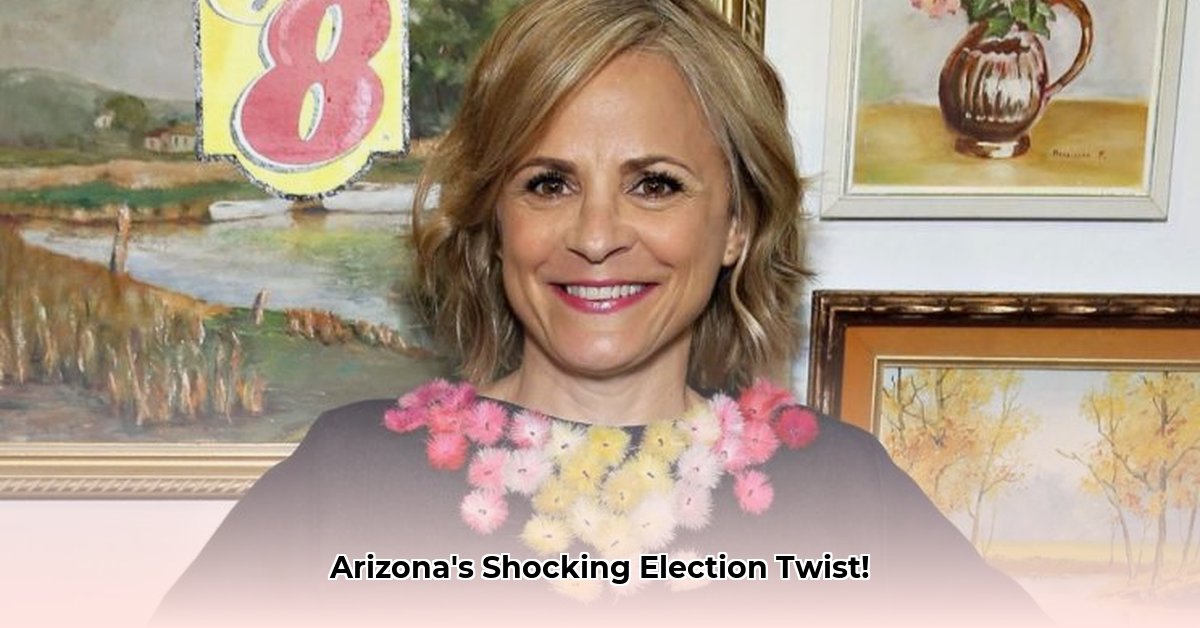The 2024 Arizona judicial elections witnessed unprecedented political engagement, with Judge Angela K. Paton’s re-election campaign serving as a focal point. For a similar case study, see this report on Oregon judicial elections. This article explores the dynamics between groups like Civic Engagement Beyond Voting (CEBV), which opposed her retention, and Arizonans for an Independent Judiciary (AFIJ), which advocated for her. It examines campaign strategies, controversies surrounding alleged conflicts of interest, and the implications for the integrity of Arizona’s courts.
A Shifting Landscape: Judicial Retention in a Polarized Era
Judge Angela K. Paton’s successful retention to the Arizona Court of Appeals, securing 66.7% of the vote in 2024, reflects a complex narrative intertwined with the state’s evolving judicial system and growing demands for transparency. This election transcended routine judicial retention votes, evolving into a politicized arena that underscores the increasing influence of partisan engagement in judicial processes.
The Rise of Partisanship: A Departure from Tradition
Unlike previous retention elections, the 2024 race surrounding Judge Paton became notably heated, symptomatic of increased political polarization within Arizona. Echoing trends observed in the 2022 cycle, where several judges faced organized opposition, judicial retention elections are increasingly contested political events. Qualification and judicial review have been relegated to secondary considerations, overshadowed by politically motivated issues.
Conflict Allegations: Dissecting the Controversy
Central to Judge Paton’s re-election bid were allegations concerning her husband’s prior service on a judicial nominating commission. Critics argued that his involvement constituted a conflict of interest, a claim amplified by opposing groups. Organizations like CEBV actively campaigned against her retention, while AFIJ rallied in support. These diverging viewpoints showcased how perceptions of judicial performance and external influences can shape election outcomes. The controversy created confusion, prompting questions about the objectivity of Arizona’s judicial candidate evaluation process beyond partisan endorsements.
Partisanship’s Double-Edged Sword: Accountability vs. Independence
The 2024 election illuminated the growing impact of partisan politics on Arizona’s judicial landscape, with voter guides and Political Action Committees (PACs) playing a significant role in shaping public discourse. While this heightened engagement may empower voters, it also risks creating confusion, complicating the process of making informed decisions. Experts debate whether this trend undermines judicial independence or simply enhances accountability. Many voters are left questioning how to evaluate Arizona judicial candidates objectively, beyond partisan affiliations.
Reforming the System: Lessons Learned and Pathways Forward
Despite the controversies, Judge Paton’s victory underscores inherent flaws within Arizona’s judicial retention system. The heightened partisan engagement signals a pressing need for comprehensive reform. Areas needing immediate attention include:
- Voter Education: Campaigns must provide clear, unbiased information about judicial candidates, enabling voters to make informed decisions based on facts rather than partisan rhetoric.
- Accessible Evaluations: Judicial performance evaluations must be more transparent, accessible, and easily understandable to the general public.
- Campaign Finance Transparency: Increased transparency in campaign funding and balanced messaging are essential to maintain the integrity of judicial elections.
Ensuring Fair Courts: Collaborative Efforts for Reform
The 2024 elections serve as a catalyst for transformative change. The future of Arizona’s judicial system hinges on addressing these critical issues through collaborative efforts.
- Unbiased Information for Voters: Voters require access to reliable, understandable information about judicial performance, free from partisan bias.
- Enhanced Judicial Performance Review: Improving the transparency and accessibility of judicial performance review data and evaluation reports is crucial.
- Political Commitment to Transparency: A commitment to transparency in campaign funding and balanced messaging is vital for fostering public trust.
The 2024 Arizona judicial retention election highlighted the urgent need for systemic change. While the debate continues, further research and engagement are crucial for progress.
Objectively Evaluating Arizona Judicial Candidates: Beyond Partisan Endorsements
Key Takeaways:
- Arizona’s increasingly politicized judicial retention elections demand objective evaluation criteria.
- The Commission on Judicial Performance Review (JPR) reports offer a starting point, but limitations warrant careful consideration.
- A comprehensive approach that incorporates multiple information sources and diverse viewpoints is essential for informed decision-making.
The 2024 Arizona Judicial Retention Elections: A Case Study in Complexity
The 2024 Arizona elections, marked by controversy surrounding Judge Angela K. Paton’s retention campaign, underscore the challenges of objectively evaluating judicial candidates. The race evolved into a battleground of competing narratives, revealing deep partisan divisions. How can voters effectively navigate this complex landscape?
Understanding Arizona’s Unique System
Arizona utilizes a system where judges are initially appointed but subsequently face periodic retention elections. This system, intended to balance merit with accountability, has become increasingly partisan, with active campaigns and voter guides often reflecting political biases. Are these sources truly objective?
The Paton Campaign: A Microcosm of Larger Issues
Paton’s campaign became a focal point for broader concerns regarding judicial independence. Endorsements varied widely, reflecting differing interpretations of her judicial record. Opponents highlighted specific concerns, including allegations of conflicts of interest, while supporters emphasized her qualifications and experience. This situation exemplifies the difficulties voters face when evaluating candidates:
- Consult Diverse Sources: Do not rely exclusively on a single voter guide or endorsement.
- Examine Judicial Decisions: Review publicly available case information to understand a candidate’s judicial philosophy and decision-making process.
- Recognize External Influences: Acknowledge the role of partisan groups and their potential biases in shaping public perception.
While this process may appear daunting, it is crucial for preserving judicial independence and ensuring a fair and impartial judiciary.
Proposition 137 and Voter Turnout: Examining Arizona’s Judicial Retention Elections
Key Takeaways:
- The failure of Proposition 137 ignited intense debate regarding judicial accountability in Arizona.
- Increased partisan involvement significantly impacted voter turnout and campaign strategies during the 2024 elections.
- The controversy surrounding Judge Paton’s campaign highlights the challenges of balancing judicial independence with public accountability.
A Watershed Moment: The 2024 Judicial Retention Elections
The 2024 Arizona judicial retention elections marked a turning point in the state’s judicial history. Judge Angela K. Paton’s re-election campaign became emblematic of this broader trend. Did the defeat of Proposition 137 influence these outcomes?
Arizona’s Judicial Retention System: A Background
Arizona’s system empowers voters to retain or remove judges through periodic elections. However, the 2024 elections deviated from this norm. The prior year saw Proposition 137, a proposed amendment to eliminate retention elections for Supreme Court justices and Superior Court judges, decisively rejected by voters. This rejection contributed to the already heated political climate leading up to the 2024 elections.
The Paton Campaign: A Case Study in Partisan Politics
Judge Paton’s retention campaign exemplified the intensification of partisan politics. The allegations of conflicts of interest played a significant role in shaping public perception. Did these allegations influence voting decisions in races like Paton’s? The election results served as a referendum on judicial accountability, highlighting voters’ desire for greater transparency and responsiveness.
The Effects of Increased Polarization
A direct correlation exists between Arizona Judicial Retention Elections and the Impact of Proposition 137 on Voter Turnout. Proposition 137’s failure amplified existing divisions and increased public awareness of the political ramifications of judicial decisions, resulting in heightened scrutiny of all judicial elections.
Reforming Judicial Accountability: A Path Forward
The 2024 elections, exemplified by Judge Paton’s campaign, underscored the necessity of reforming judicial accountability mechanisms in Arizona.
Partisan Influence in Arizona Judicial Retention Elections: A Comparative Analysis of 2022 and 2024
Key Takeaways:
- While the Commission on Judicial Performance Review provides evaluations, concerns persist regarding their limitations and transparency.
- The influence of politically motivated advocacy groups significantly shaped public opinion and election outcomes.
- The potential impact of Proposition 137 on future elections remains uncertain, though its influence is undeniable.
Judge Angela K. Paton’s Re-election: A Case Study in Partisan Dynamics
Judge Angela K. Paton’s 2024 election provides a compelling example of the increasing partisan influence on Arizona Judicial Retention Elections. Her re-election, though successful, was not without its challenges. The closely contested outcome reflects the intensifying political battles shaping Arizona’s judicial landscape.
Arizona’s Judicial Retention System: An Overview
Arizona’s judicial retention system allows voters to decide whether to retain judges in office. The 2024 elections revealed a surge in partisan involvement, fundamentally altering what was once a largely procedural process. Is this shift a positive development?
The Paton Campaign: Controversy and Allegations of Conflict
Judge Paton’s campaign became embroiled in controversy due to allegations of a conflict of interest concerning her husband’s role in a judicial nominating commission. Supporters highlighted her long years of dedicated service and positive performance reviews. The increasing visibility of these issues highlights the vulnerability of the retention system to partisan attacks.
Analyzing the Controversy: Conflict of Interest Allegations
Accusations of a conflict of interest surfaced, while Paton and her supporters staunchly defended her integrity. How can the system be made more resilient to such challenges? Establishing clearer and more objective standards for identifying and addressing potential conflicts of interest is essential.
The Broader Implications: A Systemic Concern
The closeness of the vote suggests a growing trend of partisan engagement
- How To Make Free Electricity To Run Your Home With Renewable Sources - February 12, 2026
- How to Produce Free Energy for Your Home - February 11, 2026
- How to Generate Electricity for Free at Home - February 10, 2026
















